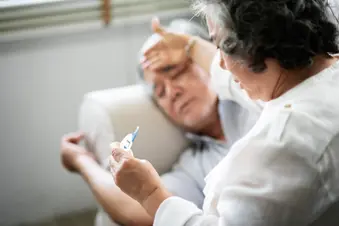
Respiratory syncytial virus (RSV) is a common infection that affects your respiratory tract. That’s your breathing passages, including your nose, mouth, throat, and lungs. Most of the time, it feels like a mild cold. But if you’re older or have certain health problems, it can be dangerous or even deadly.
There’s no specific treatment for RSV. But there are things you can do to stay safe and manage your symptoms while the virus runs its course.
How Serious Is RSV?
RSV makes the rounds every year from the fall through the spring. It’s hard to know exactly how many people get it. You may assume you have a cold, and doctors don’t test for it very often. But researchers have estimated that more than 177,000 people over the age of 65 end up in the hospital with RSV every year, and 14,000 die from it.
For most people, symptoms are mild. They start about 5 days after you’re infected and include:
- Congestion
- Runny nose
- Sneezing
- Coughing
- Fever
- Sore throat
- Headache
If your condition gets worse, you may have trouble breathing. Or you might wheeze when you breathe.
Most people are only sick for a week or two. But some people get more serious cases of RSV or complications.
What Are the Complications of RSV?
RSV can be dangerous if you’re older or have certain health problems. As you age, your immune system doesn’t work as well. You have a harder time fighting off any illness, including RSV. The virus can lead to inflammation in your lungs or a lung infection, like pneumonia.
If you have certain other illnesses, RSV can make those symptoms worse. You should be more concerned about getting RSV if you have:
- Chronic obstructive pulmonary disease (COPD)
- Congestive heart failure
- Asthma
The virus is also more dangerous if your immune system is already weak from things like cancer treatment, an organ transplant, or a disease like HIV.
When Should You Call the Doctor?
There are certain signs that you may need medical attention for your RSV infection. Call your doctor if:
- You have trouble breathing.
- Your lips, fingernails, or skin turns blue.
- You have a fever for more than 2 days.
- Your symptoms seem much worse.
If you are having trouble breathing or your skin is turning blue, call 911 and get medical help right away.
How Do You Treat RSV?
RSV could land you in the hospital. There are no treatments right now that work on the disease itself. But you might need extra oxygen or even a machine to help you breathe. People who have a lung disease like COPD sometimes get steroids or other medicines to open their airways. If you’re dehydrated, you may get fluids through a needle in your vein.
If you aren’t seriously sick, you can manage the virus on your own at home. These self-care steps can make you more comfortable while you recover:
- Drink plenty of liquids.
- Try over-the-counter medicines for pain or fever.
- Use saline nose drops.
- Get lots of rest.
- Avoid cigarette smoke.
You won’t normally get antibiotics unless you have a bacterial infection – like pneumonia – along with RSV. RSV is a virus, and an antibiotic won’t help stop it.
How Can You Prevent RSV?
Both vaccines used against RSV are FDA-approved for prevention of lower respiratory tract disease (LRTD) caused by RSV in adults who are 60 or older. Still, the best treatment for RSV may be to avoid getting it in the first place. Doctors suggest the same good hygiene habits that protect you from many kinds of infections:
- Wash your hands often.
- Don’t touch your face.
- Stay away from sick people.
- Keep out of crowds.
- Clean and disinfect surfaces that get touched a lot, like doorknobs and phones.
- Cover your mouth when you cough or sneeze.
Is a Vaccine Coming?
Infectious disease experts say the way to keep older people safe from RSV complications is to come up with a vaccine to prevent it. Several kinds of vaccines are in the late stages of clinical trials.
Show Sources
Photo Credit: eggeeggjiew/Getty Images
SOURCES:
CDC: “Respiratory Syncytial Virus Infection (RSV),” “RSV in Older Adults and Adults with Chronic Medical Conditions.”
National Foundation for Infectious Diseases: “Respiratory Syncytial Virus in Older Adults: A Hidden Annual Epidemic,” “Call to Action: Reducing the Burden of RSV Across the Lifespan.”
The New England Journal of Medicine: “Respiratory Syncytial Virus Infection in Elderly and High-Risk Adults.”
Cleveland Clinic: “Respiratory Syncytial Virus in Children and Adults.”
Mayo Clinic: “Respiratory syncytial virus (RSV).”
American Lung Association: “RSV Symptoms and Diagnosis.”
Drugs & Aging: “Respiratory Syncytial Virus Infection in Older Adults: An Under-Recognized Problem.”